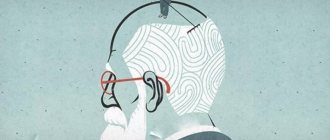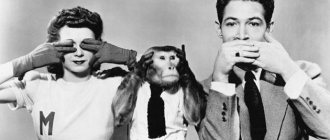“Whoever thinks that he knows anything does not yet know anything as he should know,” these words of the Apostle Paul are contained in the First Epistle to the Corinthians. And who would then suspect that they reflect the essence of one of the psychological phenomena, the discovery of which occurred on the threshold of the 21st century? They formulated the Dunning-Kruger effect, named after the scientists who confirmed its existence. What is he like?
Dunning-Kruger effect in simple words
What is the essence of the Dunning-Kruger effect? There are people who, due to their natural abilities (low IQ), gaps in knowledge, and poor education, are not sufficiently qualified to thoroughly understand the nuances of their profession in practice. They are proud that they have a diploma of higher education or have completed some prestigious courses. They boast about their achievements (which are almost 20 years old). It seems to them that no one can compare with them in performing certain professional tasks.
Against the backdrop of all this, at a crucial moment of decision-making, such people make a mistake. Depending on the specifics of the profession, this could be anything: incorrect calculations, a typo in a document, an incorrect diagnosis, choosing the wrong business partner, the dismissal of a good employee, an unfair appointment, etc. But at the same time, we remain confident that everything was done so , how to.
However, psychologists point out that there is another side to the Dunning-Kruger effect. Many perceive it too one-sidedly and are sure that it is characteristic only of stupid people who do not understand this or that matter. In practice, it is often found even in the smartest people.
What explains this paradox?
On the one hand, the Dunning-Kruger paradox can be explained by the fact that if you do not know the topic being discussed, you imagine it in general terms and evaluate your knowledge in general terms. But the more you dive into a particular area, the more details are revealed to you and the more clearly you realize how little you know. A simplified example: starting a fire. It would seem that you put the firewood in, brought a match - it’s ready. However, when you try to light it yourself, you learn that newspapers, thin and thick branches must be folded in a certain order, and you need to light the fire not anyhow, but so that the branches grab. Yes, and you also need to place the firewood correctly.
Dunning and Kruger also noted that people who are not knowledgeable about the topic at hand, due to their low level of knowledge, cannot realize their mistakes (we will talk about this in more detail below). Consequently, they cannot give professional assessments of their judgments, and this also makes it difficult to correlate their own level with the level of professionals.
On the other hand, if you are a professional and easily solve various problems in your field, you may simply not understand why they cause difficulties for someone - for you it is very easy. This is one of the reasons why a professional tends to downplay his knowledge and skills - he does not see anything special in them. This often becomes an incentive for self-improvement, further learning, expanding knowledge, etc., which ultimately makes a competent person even more competent. And this is a very positive consequence of the Dunning-Kruger paradox. We will consider other consequences below.
How to determine?
For example, a person is a brilliant engineer with a good education, successful in his profession. At the same time, he adequately assesses his abilities in this field: he constantly double-checks everything, consults with others, and improves. But in parallel with this, he has also been playing chess since childhood. From childhood, his parents instilled in him that he was almost a world-class grandmaster. A couple of victories in school competitions - and he already feels like a real professional. Losing over and over again, he will attribute it to coincidence, but will never admit to his own mistakes.
Michael from The Office is a typical bearer of the effect.
Thus, the same person in one field can manifest himself as a carrier of the Dunning-Kruger effect, and in another he will be a completely adequate professional. This should be kept in mind by those who are trying to understand the features of this psychological phenomenon.
What personality traits and behavior are characteristic of those who are carriers of the Dunning-Kruger effect:
- overestimating one’s own skills, strengths and capabilities;
- inadequacy of perception of the high level of skills of others in the industry;
- inability to recognize one's own incompetence;
- tendency to realize one’s mistakes after professional training.
Since this concept is relatively new in psychology, scientists are still conducting research to determine the character traits and typical behavior of people who are characterized by the Dunning-Kruger effect. So this list will most likely be replenished in the near future.
Dunning-Kruger effect plot
The vertical axis shows the degree of confidence (from low to high). Horizontal - level of professionalism (beginner, sage and guru). According to him, this psychological phenomenon is observed mainly at the beginning of a career path, when a person is full of hope and self-confidence. And only then, on the path of transforming from a teapot into a high-level specialist, does he get rid of this yoke. The following milestones are indicated on the chart.
Peak of stupidity
A beginner has a low level of qualifications and a small amount of knowledge, but at the same time is very self-confident. He sincerely believes that his skills and competence can outshine anyone and ultimately save the world. He sees himself as a Nobel laureate and the latter-day Steve Jobs. He doesn’t listen to anyone, because he’s sure that none of his colleagues are capable of reaching his level. He makes a number of total mistakes that he simply does not see or realize. They bring him to the peak of stupidity.
There are only 2 ways from there. The first is to stay on it for life, hand in hand with your Dunning-Kruger effect. Such people constantly change jobs and blame their failures on fate and management, which underestimates them. The second is to engage in self-development in order to grow further professionally. This helps to realize reality. The man is finally freed from overconfidence and falls into the valley of despair.
Pit of Misery
At this point in the graph, a person eats away at himself with regrets about the time when, due to excessive self-confidence, he made too many mistakes in the professional field. Shame creates a lack of confidence in oneself and one’s professional qualities. Everyone, depending on their own strength of spirit, experiences this stage in their own way.
Some people stay there for a very long time, without taking any active action and constantly doubting their every step. Others are helped by the support of a loved one, the trust of their boss... They gradually climb out of the pit of suffering onto the slope of enlightenment.
Slope of Enlightenment
Those who have already been in the pit of suffering pull themselves together and, despite their inferiority complex, begin to develop, complete courses, gain experience from their elders, forcefully take on difficult tasks and complete them, taking into account and analyzing mistakes. They understand that only teaching will allow them to achieve at least some heights.
The slope of enlightenment is one of the main steps on the path to becoming an expert. Self-esteem gradually increases, but is already much more adequate than that of a beginner. Knowledge and experience are acquired. Errors are becoming less and less. Each of them still hurts, but is acknowledged, analyzed and corrected.
Stability plateau
Professionalism is brought almost to the point of automaticity. All courses available have been completed. All heights have been conquered. There is plenty of experience and experience. And errors at this stage are practically excluded. The bosses respect and offer high positions. A decent salary, recognition from colleagues, victories in professional competitions, responsible projects - all this gives the name to this point on the graph, but...
This is where the opposite effect of the Dunning-Kruger effect is observed. A person begins to understand how much he still does not know. This gives rise to internal contradictions and doubts in him. He doesn't think of himself as a genius. On the contrary, he believes that he still has to grow and grow.
Reasons for the effect
People become victims of the effect for the following reasons:
- low IQ as a result of natural data (heredity);
- errors of upbringing (parents/teachers/relatives/environment) undeservedly extol the child’s talents and abilities, instilling in him false confidence in his own strengths and capabilities;
- gaps in knowledge for various reasons: failure to attend classes, purchased diploma, irresponsible attitude to study;
- character traits such as self-confidence, high self-esteem, love of fame and success, superficiality and frivolity.
Sometimes the reason is a simple lack of experience, which is clearly demonstrated by the Dunning-Kruger effect graph. Immediately after graduation, most students overestimate themselves in terms of professionalism. It seems to them that they are already savvy enough to immediately take a chair in some business office and command people from there. As a rule, such a worldview quickly crumbles to smithereens after several failures and dismissals. For which, of course, everyone around is to blame, but not the newcomer himself.
Which candidates should you pay special attention to?
The explosive mixture of incompetence and self-confidence is especially destructive for a company in which such an employee holds a leadership position. In this case, overestimating your own capabilities is not the worst thing that can happen. It’s worse when such a “leader” is not able to adequately assess the personal and professional qualities of team members. It creates an unhealthy atmosphere in the team, based on criticism and underestimation of abilities. Subordinates have no chance to show all their professionalism and grow their careers. As a result, the best employees leave, and only those who accept the rules of the game and satisfy his self-confidence remain to work under such a manager.
Test to detect the Dunning-Kruger effect?
Since the effect is a relatively new concept in psychology, full-fledged tests in the form of questionnaires to identify it are still in development. However, there is one graphical test that is used for this purpose. It is the simplest, but at the same time quite effective.
Graphics test
To identify the effect in the applicant, and this is important for every businessman to know before hiring a new employee, you will need a piece of paper and a pencil.
Draw a square on a piece of paper and ask the candidate to imagine that this is their “professional field.” Ask to fill in the part of the square that reflects the applicant’s level of professional knowledge. Explain: a person who believes that he has mastered the profession 100 percent usually paints the entire square.
If the applicant does this, there is a suspicion that he cannot critically evaluate himself, his qualifications are low. It probably exhibits the Dunning-Kruger effect. Only an unqualified specialist can seriously believe that he knows everything in the profession. A true professional is deeply immersed in the field of knowledge and sees how limitless it is. He is aware that there is still something to strive for, understands that knowledge is constantly updated and he needs to develop and improve his professional level. Even recognized experts in their field do not completely shade the square.
There is a children's interpretation of this test, which allows you to promptly identify a child's excessive opinion about his abilities in any area of knowledge. Schoolchildren are asked to color the square with a pencil exactly as much as they assess their own talent and success.
Case trick
Ask your company’s specialists to formulate a professional case question for the candidate. Let them make sure that the overall formulation of the problem is clear, but that additional data is required for a correct solution. If the candidate is truly a professional, he will definitely ask for the missing information. In any case, he will note that they are necessary to offer the correct solution.
If you ask an experienced doctor: “Why do I feel tired more and more often?”, he will name several possible reasons. But he will add that you need to undergo an examination, take tests, and only then will he give a final answer. An amateur will most likely answer the same question: “Obviously, it’s time for you to go on vacation.” Simply due to his incompetence, he does not assume that it is necessary to collect additional information. This applies to specialists in any field of activity.
Diagnostics
Since the Dunning-Kruger effect is a relatively new concept in psychology, full-fledged tests in the form of questionnaires to identify it are still in development. However, there is one graphical test that is used for this purpose. It is the simplest, but at the same time quite effective.
To take the Dunning-Kruger effect test, you will need a piece of paper and a pencil.
- Task No. 1: draw a large square on the entire sheet (you can use a ruler). He will represent you.
- Task No. 2: fill it in with a pencil exactly as much as you feel like a competent person.
Interpretation of test results:
- if you have completely filled in the square, you are a prime example of the Dunning-Kruger effect;
- if you have painted over more than 75%, you have either recently gotten rid of this effect, or, on the contrary, are showing a tendency towards it;
- if you painted over about 50% - everything is fine, no big deal, from the point of view of psychologists, this is how it should be;
- if less than 50% is painted over, your professional self-esteem is too low, which urgently needs to be raised.
This test is often used by HR managers and company executives when hiring candidates. It helps them distinguish between amateur beginners (who exhibit the Dunning-Kruger effect) and true professionals.
There is a children's interpretation of this test, which allows you to promptly identify a child's excessive opinion about his abilities in any area of knowledge. Schoolchildren are asked to color the square with a pencil exactly as much as they assess their own talent and success.
What to do?
The Dunning-Kruger effect interferes with the life of not only its bearer, but also those who have to deal with it in the professional field. How to fight?
What should the carrier do:
- Take the Dunning-Kruger effect test. Make sure it is there.
- Diagnose your own mistakes in the professional sphere. How often do they happen? What causes them? Admit that you yourself are to blame for them.
- Engage in self-improvement: enroll in advanced training courses, read specialized scientific literature.
- Consult with older and more experienced colleagues.
- Learn self-criticism.
What to do for those who are faced with a prominent representative of this psychological phenomenon:
- Do not argue, do not humiliate, do not raise your voice. It's a waste of time.
- After making another mistake, first analyze it yourself, collect evidence of who is to blame for it, and present it to the amateur. But with calm explanations, not complaints.
- Offer help in solving various work tasks, or at least doing them together.
- Involve management and other colleagues in this.
If no one does anything to combat this phenomenon, people with the Dunning-Kruger effect can spend most of their lives at the peak of stupidity (see graph). This threatens the lack of any career growth and the conservation of the knowledge and skills that were originally available. Lack of self-improvement leads to a decrease in IQ level.
Historical background
Although the principle itself was formulated in 1999, the authors note similar observations among philosophers and scientists:
- Lao Tzu (“He who knows does not speak, he who speaks does not know”),
- Confucius (“True knowledge is to know the limits of one’s ignorance”),
- Socrates (“I know that I know nothing”),
- Bakunin (“...it is the best people who are least convinced of their own merits; even if they are aware of them, they are usually disgusted with imposing themselves on others, while bad and average people, always satisfied with themselves, do not experience any embarrassment in self-glorification”)
and also in the above statements of Bertrand Russell and Charles Darwin.
In the Bible there is a saying of the Apostle Paul: “Whoever thinks that he knows something, still knows nothing as he ought to know” (1 Cor.).
Geraint Fuller, in his commentary to the article, noted that a similar idea was expressed in William Shakespeare’s “As You Like It”:











